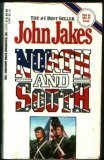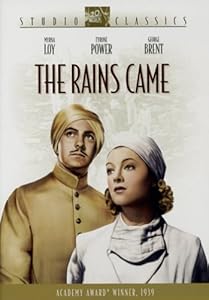This morning has been one of entertainment and revelation, as well as finding two more writers I want to get to know much better now that I know so little about them. Odd phrasing, I know, but true, nonetheless.
I met John Jakesthrough a short article he did for the June issue of The

Cover via Amazon
WriterMagazine. Though I’ve dabbled in his books, I never stopped to pay attention to the one behind the words. That privilege came with his article.
Jakes talks about how plot, while important, seldom brings someone back for a second reading of a book. Rather, it is a character that calls the reader back for another look into the life represented within the confines of the book’s covers. That reasoning is one I can agree with without reservation.
At fifteen, Louis Bromfield’s marvelous novel “The Rains Came” leaped off the school library’s shelf and into my waiting hands. This story for more mature

Cover of The Rains Came
audiences both surprised my composition teacher and dismayed her. She felt I wouldn’t be able to grasp the complexity of its story, characters, and plotline at a mere 15 years old.
I devoured this story of colonialist India with it’s coming revolution for sovereignty and its interwoven native characters and English colonials, its love stories—both adulterous and forbidden inter-racial unions, and its political statements. I couldn’t put it down. The depth of the story spoke volumes to me. I wanted more and took the time to find just that.
I went to the public library to find more books by this author. I came away with his Pulitzer winner, “Autumn Leaves” and counted myself fortunate that it was available. I’d discovered a world beyond kid’s literature. I could read something again with the depth and knowledge of Tennyson, Homer, and Shakespeare and get away from what was “acceptable” for my age bracket.
I understoo
This morning has been one of entertainment and revelation, as well as finding two more writers I want to get to know much better now that I know so little about them. Odd phrasing, I know, but true, nonetheless.
I met John Jakesthrough a short article he did for the June issue of The

Cover via Amazon
WriterMagazine. Though I’ve dabbled in his books, I never stopped to pay attention to the one behind the words. That privilege came with his article.
Jakes talks about how plot, while important, seldom brings someone back for a second reading of a book. Rather, it is a character that calls the reader back for another look into the life represented within the confines of the book’s covers. That reasoning is one I can agree with without reservation.
At fifteen, Louis Bromfield’s marvelous novel “The Rains Came” leaped off the school library’s shelf and into my waiting hands. This story for more mature

Cover of The Rains Came
audiences both surprised my composition teacher and dismayed her. She felt I wouldn’t be able to grasp the complexity of its story, characters, and plotline at a mere 15 years old.
I devoured this story of colonialist India with it’s coming revolution for sovereignty and its interwoven native characters and English colonials, its love stories—both adulterous and forbidden inter-racial unions, and its political statements. I couldn’t put it down. The depth of the story spoke volumes to me. I wanted more and took the time to find just that.
I went to the public library to find more books by this author. I came away with his Pulitzer winner, “Autumn Leaves” and counted myself fortunate that it was available. I’d discovered a world beyond kid’s literature. I could read something again with the depth and knowledge of Tennyson, Homer, and
One of the things that many writers have complained about is finding balance in their writing lives. For me it’s an every-day struggle.
For the past two weeks my time has been spent reading: journals, writer’s magazines, novels, newspapers, marketing lists, and grant listings.
Oh, yes. I’ve run through a gauntlet of publishing advice, writer’s key points to remember, plus a myriad of funding choices and recommended sources for those who are proposal challenged.
Considering all of that, you might wonder what I came away with.
Let me say this. I’m someone who’s always been expected to finish all projects as quickly as possible and to perfection. Does this give you a clue as to my stress level concerning any given project?
I’ve almost come to a point of accepting a typo, grammatical error, or other minor flaw as not requiring blood-letting. ALMOST. Biting one’s tongue to keep from screaming out loud doesn’t count.
This expectation of mine stalls submissions but doesn’t stall idea generation. That’s where the problem comes in. I have too many ideas.
It takes little to send me haring off on the scent of a possible new rabbit before it goes down the nearest hole and disappears. Why?
When I have so many pending projects already in various stages of completion, I become overwhelmed by the volume.
Discouragement rears up and hisses at me when I start to go back to tackle one of the Needs-To-Be-Finished projects. I lived in rattlesnake country too long, I guess. I tend to back off when something—anything—hisses at me. As a result, I’ll begin yet another story, article, etc., instead.
Soon I have an avalanche waiting to descend and smother me.
My fairy godmother arrived during this last reading frenzy. I caught up on my perusal of back issues of The Writer Magazine. In the December, 2011 issue, editor and author, Linda K. Wertheimer, wrote a timely essay; one that I desperately needed now.
She wrote “Perfecting the Art of Slowness,” which detailed how she had to return to the discipline of small daily practice sessions used for becoming a first chair flutist in order to find real success later in writing.
It sounds so simple to hear someone else say it, doesn’t it; slow down, two small words that could make or break a story, submission, or query.
Her advice got me to thinking hard about how I used my time and organized my work. If I teach myself to envision a large stop sign at the end of each phase of a project, pause to look both ways—back to the beginning as well as toward the finish line—and ease out into the flow of time traffic, I would have fewer frustrations, missteps, and avalanches.
When I couple that strategy with practicing the art of merely writing down new ideas rather than beginning the whole new project, current projects can be finished more regularly and well.
I’ve begun my daily practice. Each day I take out one project, children’s lit or adult, read through it, and begin the revision. I work for one hour on editing and then go looking for markets for the piece. By the time I return to it, I’ve removed myself far enough that a final edit can commence.
Hopefully, I’ll be able to clear out my backlog of material, and continue to work on current projects, an hour at a time. I’ve discovered that it isn’t so much that I’m mismanaging my time as it is a matter of clearing inventory. An hour isn’t much to devote to something that can leave home and live on its own, after all.
Tell me about your own struggles, downfalls, and strategies. Until later,
A bientot,
Claudsy
 3 Comments on Finding Balance and Launching Projects, last added: 1/31/2012
3 Comments on Finding Balance and Launching Projects, last added: 1/31/2012





 Is the advice “write what you know” valid? Yes, definitely. And no, not always.
Is the advice “write what you know” valid? Yes, definitely. And no, not always. keep the information in a writer’s notebook.
keep the information in a writer’s notebook.
Have you ever read any urban fantasy by Charles DeLint?, I was just curious
I haven’t read him in a long while. Not that I get much chance to read anything non-work related lately. I used to love those stories, though.